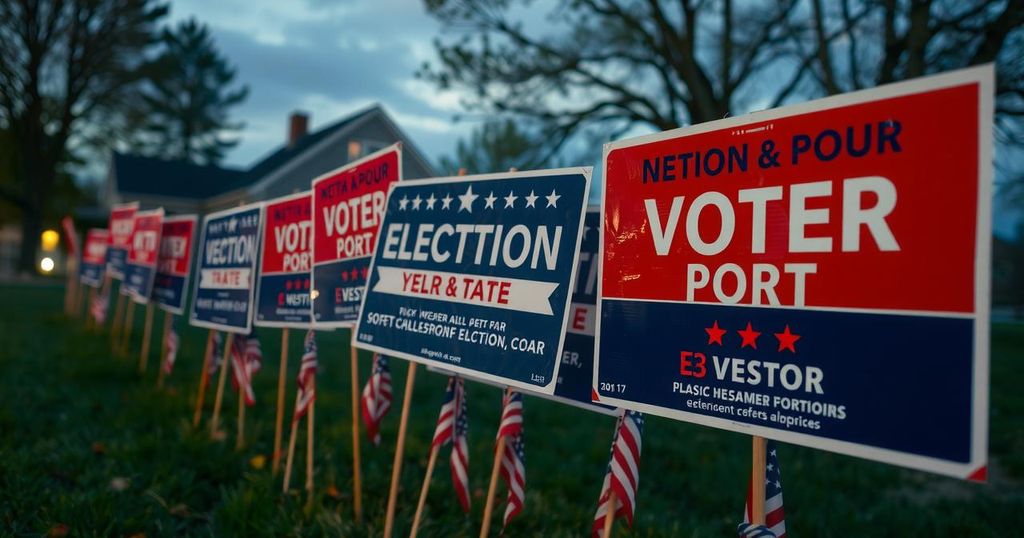The article reflects on the author’s insights as a newcomer to America during the election season, focusing on the culture of yard signs, which serve as informal indicators of political preference. The author compares this unique form of electoral expression to their experiences abroad and emphasizes the accessibility and personal nature of these signs as an embodiment of democratic participation. The author articulates a journey from observer to active participant, celebrating the significance of these seemingly simple symbols of political expression.
As a newcomer to America, particularly in Maine, I have found the election season both surprising and intriguing. This marks my second presidential election experience, and I am struck by the stark contrasts with elections I have observed elsewhere. My initial voting experience in 2020, when Donald Trump faced Joe Biden, was a whirlwind of stress and excitement. With another election looming, I find myself once again grappling with a mix of anxiety about the outcome and the thrill of participation in the democratic process. A particularly captivating aspect of American elections, especially for someone from a different cultural background, is the prevalence of yard signs. Driving through Maine, the sight of these signs is ubiquitous, resembling a seasonal bloom as the election draws near. For me, they serve as an informal education about local candidates—ranging from school board members to congressional representatives—and offer a glimpse into the political inclinations of my neighbors. Some display signs in support of their chosen presidential candidate or party with pride. This year, I have embraced this American tradition by placing a Harris-Walz sign in my yard, while my neighbors display a Trump-Vance sign. The experience of surveying my neighborhood for these signs has become a playful activity. In essence, these signs provide a subtle yet clear representation of individual political beliefs—a phenomenon I had not encountered during my time abroad. Reflecting on my experiences in Nairobi, Kenya, during a presidential election, I recall an absence of yard signs. The political landscape there was dominated by oversized billboards and banners, with candidates’ images prominently featured in public spaces. While visually striking, they lacked the personal touch that American yard signs embody. Here, such signs feel like an extension of one’s identity and a visual proclamation of support: “I endorse this candidate, and I want you to know.” What resonates with me most is the informal nature and accessibility of this custom. In the United States, expressing political opinions does not require affiliation with a political elite; a simple yard sign can communicate a message as effectively as a rally. This aspect underscores a fundamental truth in this society: every voice has significance, and individuals need not possess wealth or influence to assert their perspectives on the future of their community or country. For me, as a newly minted citizen, these signs transcend mere political advertisements. They represent the very spirit of democracy—serving as a tangible reminder of the rights I have diligently fought to earn. In contrast to many regions where elections provoke trepidation, I perceive a distinctive sense of freedom and empowerment here, even amid the stress and anxiety that accompany electoral periods. I am now an integral part of a system that allows me not only to vote but also to express my views through something as simple as a sign on my lawn. Although election seasons in the United States can be lengthy and intense, the associated excitement, anticipation, and occasional strain encapsulate a uniquely American experience. It is heartening to observe a culture that promotes public participation, discussion, and open debate on civic matters. As I prepare for my second presidential election, I carry forward the lessons I have learned from my initial experience—patience, hope, and the understanding that my vote holds weight. The yard sign in front of my home, while modest in stature, symbolizes my journey: evolving from an immigrant observing from the sidelines to an active participant in this democratic process. This transformation is truly remarkable.
This article explores the author’s personal reflections on America’s election season, particularly focusing on the cultural significance of election yard signs. The author, a newcomer to the United States, contrasts this tradition with electoral customs from their previous experiences in another country, specifically highlighting the accessibility and personal connection inherent in displaying yard signs as a form of political expression. This narrative provides insight into the unique aspects of American democracy and the author’s burgeoning participation in it.
In conclusion, the author’s exploration of American election yard signs sheds light on the intrinsic values of democracy, including participation and the significance of individual expression. The experience represents a personal rite of passage from observer to participant, reinforcing the idea that every citizen’s voice matters in the democratic process. This simple yet profound custom illustrates the broader themes of freedom and personal empowerment within the electoral landscape of the United States.
Original Source: www.pressherald.com







